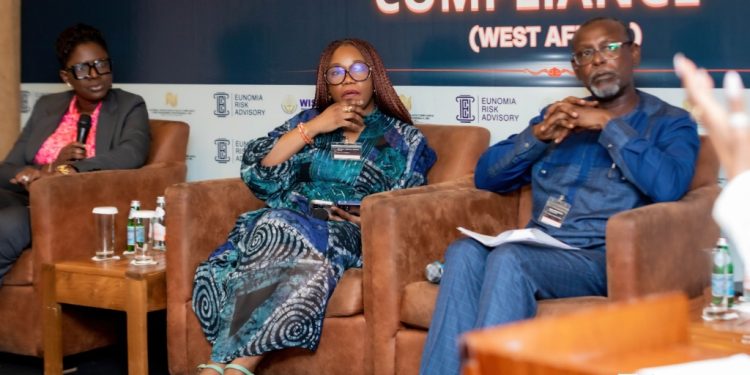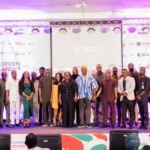From left to right – Aurelius Awuku, Assistant Secretary, Ghana Bar Association; Marcia Narine Weldon, Forum Program Faculty Lead; Madam President Efua Ghartey, Ghana Bar Association; Tiffany A. Archer, Esq., President, Eunomia Risk Advisory & Forum Convenor; Nana Adjoa Adobea Khartey, Senior Partner, Afrimore Advisors; and Andrew Appau Obeng, Vice President, Greater Accra Regional Bar Association in a group photograph at the forum
…Demand Africa-centered governance models over western imports
Africa can no longer wait to be included in the global governance conversation—it must now assert its place as a co-architect of governance systems that are ethical, contextually relevant, and future-ready. This was the prevailing message from the inaugural Executive Forum on Strategic Compliance in West Africa, convened in Accra under the leadership of Tiffany A. Archer, Esq., Founder and President of Eunomia Risk Advisory Incorporated.
The Forum brought together distinguished leaders across sectors—from government and diplomacy to academia, legal practice, and corporate governance—to engage in candid, high-level dialogue on the future of governance, risk management, and compliance across Africa and beyond.
The event was convened by Eunomia Risk Advisory and its strategic collaborators, and supported by institutions including the Institute of Directors (IoD), Ghana Bar Association (GBA), African Corporate Governance Network (ACGN), Public Procurement Authority (PPA), Bank of Ghana (BoG), Ghana Institution of Engineers (GhIE), and State Interests and Governance Authority (SIGA).
‘Africa is Building Its Own Table’ – Tiffany A. Archer, Esq.
In her welcome address, Tiffany A. Archer, Esq., a globally respected governance expert, lecturer at New York University (NYU) and Fordham Law School, and founder of the Executive Forum, set the tone for the day’s discourse. “This is not just a convening, it is a signal that Africa is not waiting to be invited to the table. We are building our own with integrity, intelligence, and intention,” Ms. Archer said.
She noted that some of the most courageous and values-driven leadership she has encountered comes from the West African region. “What is needed now is not imported prescriptions, but platforms for African leadership to be seen, heard, and strengthened,” she added.
Ms. Archer, whose career spans compliance leadership roles at Fortune 200 companies and global law firms, and advisory work before the U.S. Department of Justice and Securities and Exchange Commission, highlighted that Eunomia’s mission is to help organisations translate commitment into measurable capacity through data-driven, behavioural insights.
Professor Douglas Boateng: “Governance must move from image to impact”
Delivering the keynote address, Professor Douglas Boateng, Chairman of PanAvest International and Africa’s first Professor Extraordinaire for Supply and Value Chain Management, called for a wholesale rethink of Africa’s governance structures. “Western-style governance models can only take us so far. If we do not reimagine governance, we remain trapped in ceremonial leadership and short-term cycles,” he said. “Ghana led the continent’s political independence. We must now lead its economic emancipation through Afrocentric governance rooted in our realities,” he further elaborated.
Prof. Boateng’s remarks were grounded in over three decades of experience across boardrooms on five continents. He announced that his newly published governance book—written in collaboration with Eunomia—has been approved by the National Council for Curriculum and Assessment (NaCCA) for secondary school use in Ghana, and is under consideration in other African nations. The goal, he said, is to build generational governance literacy by “catching them young.”
Governance from the boardroom to the community
The panel sessions featured robust, sometimes provocative exchanges among industry leaders. Professor Marcia Narine Weldon, Director of the Transactional Skills Program at the University of Miami School of Law, Forum Program Faculty Lead, and former Fortune 500 executive, brought a comparative global perspective to the Forum. “From my work across Latin America, the U.S., and now here in Africa, what stands out is the unique opportunity African leaders have to craft governance models that are not only ethical but also culturally intelligent and community-driven,” Prof. Narine Weldon noted.
She stated that the prevailing notion used to be that the U.S. was the world’s compliance policeman. “That is no longer the case. There is space—and necessity—for African leadership to shape global compliance standards,” she said. Prof. Narine Weldon, who also serves on cross-border governance initiatives and teaches artificial intelligence in compliance, emphasised the role of law and technology in strengthening institutional resilience.
Legal, regulatory and cultural perspectives
The legal dimensions of governance reform were explored by NanaAma Botchway, Founder and Managing Partner of n. dowuona & company, and a respected corporate director. Mrs. Botchway noted the confusion among SMEs regarding governance roles and structures. “We need to simplify the governance framework, especially for small businesses. Most do not even realise they have a board,” she said. “Our laws are inherited from other jurisdictions and often disconnected from our cultural context. The framework must reflect how we actually work and relate,” she added.
Her comments sparked a spirited debate with GuyChristian Agbor, a legal scholar based in New York and President of the Global Association of Certified Anti-Illicit Financial Flows Professionals. Mr. Agbor introduced his ESGTT framework—adding Technology and Taxation to traditional ESG—arguing for mandatory enforcement mechanisms to address what he described as “corporate blackmail” from multinationals demanding incentives without accountability. “Corporations need us. We are the consumers. We must stop accepting the idea that we need to beg for their presence. Governance must move beyond theory. It must be enforced,” he said.
Ambassador William G.M. Brandful: “Bridge the Disconnect”
Ambassador Dr. William G.M. Brandful, retired diplomat and Ambassador-in-Residence at Wisconsin International University College, highlighted the disconnect between Africa’s development plans and citizen engagement. “Agenda 2063 is a noble framework, but we have not sufficiently involved ordinary Africans in its implementation,” he said, adding that for governance to have impact, it must be understood, internalised, and owned by the people, not just the elite.
He added that despite statistical benchmarks showing Ghana at 46 percent progress toward Agenda 2063 goals, the real measure should be visible improvements in people’s daily lives.
Professor Edmund Ato Kwaw: Mobile money and the AfCFTA opportunity
Professor Edmund Ato Kwaw, Associate Professor and Head of Law at Wisconsin International University College, presented a detailed analysis on digital finance and compliance risks. He called for harmonised mobile money regulation across Africa, noting that over 70 percent of the world’s mobile money users are in sub-Saharan Africa. “Mobile money is no longer an experiment, it is infrastructure. If we are serious about the African Continental Free Trade Area (AfCFTA), we must ensure our mobile finance systems are not only inclusive but secure and compliant,” Prof. Kwaw explained.
He warned that current gaps in anti-money laundering controls, identity verification, and jurisdictional oversight pose long-term risks unless addressed through continental cooperation.
A call to action
The Forum concluded with a consensus that governance reform in Africa must be generational, not cyclical. Participants called for stronger boards, ethical leadership, simplified governance for SMEs, and broader public education. “Compliance is not just about rules—it is about protecting the future. This is not a Ghanaian issue. It is not a West African issue. It is a Pan-African opportunity,” Ms. Archer noted.
About Eunomia Risk Advisory
Eunomia Risk Advisory Incorporated is a boutique consultancy dedicated to strengthening governance, ethics, and compliance in emerging markets through behavioural science, data analytics, and strategic foresight. Founded by Tiffany A. Archer, Esq., Eunomia supports public and private organisations in reforming culture, mitigating complex risks, and translating values into sustainable impact. The firm is headquartered in New York with a growing presence across Africa, Latin America, Europe and the Middle East.
DISCLAIMER: The Views, Comments, Opinions, Contributions and Statements made by Readers and Contributors on this platform do not necessarily represent the views or policy of Multimedia Group Limited.
Tags:
DISCLAIMER: The Views, Comments, Opinions, Contributions and Statements made by Readers and Contributors on this platform do not necessarily represent the views or policy of Multimedia Group Limited.
- President Commissions 36.5 Million Dollars Hospital In The Tain District
- You Will Not Go Free For Killing An Hard Working MP – Akufo-Addo To MP’s Killer
- I Will Lead You To Victory – Ato Forson Assures NDC Supporters
Visit Our Social Media for More




